Time for some fun.
There was some discussion in class in the previous week concerning whether or not we thought that Nietzsche’s sovereign individual, as ideal, could ever be realized. I cannot recall whether the class came to any consensus on the matter but the debate led me to ponder whether I could actually think of anyone in my list of family members, friends, and more distant acquaintances who I thought embodied this ideal; alas, I could think of no one. I could, however, think of plenty of fictional characters who I would bestow with this label. One of my primary interests in philosophy is examining new mediums in which philosophy might find or has already found expression; not everyone has the patience or the ability to read through a dry analytic philosophical text to extract those few precious and salient points. Subsequently, I suspect that Nietzsche, who uses a wide variety of rhetorical devices to persuade his audience of his position, would be sympathetic to this interest; as David Owen says, “as a philosophical writer, Nietzsche does not limit his reflective engagement with morality to the provision of good arguments but extends this engagement to considerations of how best to exhibit and mobilize the force of the reasons he offers”. Consequently, I think Nietzsche would be quite pleased to find that the ideal of the sovereign individual, whether he is realizable or not, has become pertinent in popular culture, at least in one particular medium. At the risk to revealing too much about myself I will tell you that the medium I have in mind is animation and the fictional character is a boy named Monkey D. Luffy.
Luffy is the protagonist in a series called One Piece by Eiichiro Oda which is both a comic and an animated television program; Luffy’s ambition is to be the King of the Pirates. Duly, I would be extremely surprised if no one in my seminar had heard of him. With seventy-two volumes and over six hundred episodes, One Piece has been going strong for fifteen years. Hundreds of thousands of people engage with One Piece, many of them children who emulate the characters, especially Luffy upon who the spotlight is generally fixed. Significantly, Luffy, as far as I can tell, is a perfect fictional embodiment of the sovereign individual, which, as I hope most people realize in this day and age, unless they are in the habit of underestimating popular culture, is no small thing
What makes Luffy a sovereign individual? To start with, Luffy is depicted as a wholly autonomous character, even as a young child. Flashbacks in the series reveal that Luffy and his brothers, Ace and Sabo, grew up among a group of retired mountain bandits, the head of which is their foster mother, Dadan; Dadan is merely a figurehead, however. The boys neither listen to her nor live under the same roof as her; they live on their own in a giant treefort which they built in the forest on the outskirts of town, gathering their own food for survival, and stealing money from local criminals which they are saving to buy a pirate ship.
Besides asserting his financial and comestible autonomy, Luffy also asserts his ambition to become the King of the Pirates despite his grandfather Garp’s threats and relentless insistence that it is imperative for Luffy to join the Marines. Consequently, Luffy goes on to pursue his own ambitions, gathering a ship, a crew, and going on extraordinary adventures.
Like Nietzsche’s sovereign individual, Luffy places a significant amount of importance on his freedom. In one instance, for example, Luffy’s mentor, Silvers Rayleigh, asks him why he wants to be the pirate king; Luffy tells him that “I don’t want to conquer anything; it’s just that the person with the most freedom on the sea is the pirate king”. Above all else, Luffy values and desires freedom, a sentiment which is expressed in his ultimate ambition to become the pirate king.
In addition, although never explicitly stated, it is no stretch to say that Luffy, like Nietzsche’s sovereign individual has a “proud consciousness of power and freedom.” Luffy lives his life in the manner that he desires without regret indicative of his awareness of his freedom. He frequently proclaims that in setting himself upon becoming that King of the Pirates, he does not care if he dies trying: “if I die trying then at least I tried!” In addition, Luffy overcomes nearly every enemy he intends to defeat. Notably, one of his favourite catch phrases is “I’m going to kick your ass,” and when Luffy asserts this, the audience can be assured that he will do just that. Consequently, in only a short amount of time, Luffy becomes one of the most wanted pirates on the seas owing to the immense havoc that his abilities create. Among the enemies who Luffy takes down are included a group of elite government agents who threatened his crew and two of the seven warlords of the seas, very powerful pirates associated with the government. Despite his wanted status, however, Luffy is utterly fearless and when not confronting an enemy, more or less carefree suggesting that he is also aware of his strength.
Like the sovereign individual, Luffy is not bound by moral rules as customary constraints but as the freely endorsed commitments through which he gives expression in his own character. While the world government and the Marines often call pirates “bad” and “evil” these customary classifications have no import for Luffy. While on Fishman Island, for instance, the mermaid princess Shirahoshi asks Luffy if being a pirate makes him a bad person: “Luffy, since you’re a pirate, does that make you a bad person?” Luffy merely responds by saying “Dunno. Decide that for yourself”. Later on in the story arc, the citizens of Fishman Island, confused as to where the allegiances of the Luffy and his crew lie pose a similar question; they ask “are you friends or foes of Fishman Island?” Luffy simply responds by telling them “whether we’re friend or foe is up to you to decide”. For Luffy, actions speak louder than words or rather, the doing is the being, and it is through his actions that he defines himself and creates his own moral values, suggesting that other people do the same.
In another incident, Luffy encounters a powerful enemy on the sky island, Skypiea, named Eneru who insists that he is a God. Eneru wantonly causes destruction, however, leading Luffy to scoff, “quit calling yourself a God! What kind of God destroys everything and saves nothing?” Although Eneru insists that he is a God, Luffy argues that his actions attest otherwise; it is actions for Luffy which have real import, not words.
Finally, Luffy, like the sovereign individual, is a man who keeps his promises: “one’s deeds are criterial of one’s intentions thus for the sovereign individual it is essential to a promise’s being made in good faith that the agent intend to act on it and that he does indeed do so”. Luffy makes several important promises in the series. One of the promises that he makes is a promise to save his brother, Ace, from execution after Ace was captured by the World Government. Consequently, Luffy goes to extraordinary lengths to keep this promise, breaking into the allegedly impenetrable prison, Impel Down, and engaging in a dangerous war at the Navy base, Marineford; in both of these incidents, Luffy comes very close to dying. Luffy does not save his brother, however, his actions, according to Owen’s criteria, are excusable. Owen admits two excuses for a promise being broken; in the first case, honouring one’s commitment is causally impossible due to circumstances beyond one’s control hence one cannot physically do what is required. In the second case, keeping a promise is normatively impossible due to circumstances beyond one’s control so one must not ethically do what is required. The circumstances that lead up to Ace’s death are causally out of Luffy’s control, thus, he is excused viz the first case. Luffy intended to keep his promise but despite his best efforts, it was simply impossible. Ace is killed by an Akainu, a navy Admiral who overpowers him.
Furthermore, like Nietzsche’s sovereign individual, Luffy, in failing to keep a promise, “acknowledges a debt to addressee of [his] commitment and that reparations be due”. When Luffy made a promise to save his brother Ace, he made a promise both to his brother and to himself. Luffy could not repay Ace for his failure so instead inflicts physical and emotional punishment on himself as reparation. Luffy “willingly bears [the] responsibility for[the] damage when his commitment could not be kept”. In addition, he makes a further promise to himself that he will “protect everything”. Owen mentions that what counts as keeping a promise for a sovereign individual “cannot be fully specified in advance and independently of a particular way of keeping it” and indeed, the specifications of Luffy’s promise are vague and only realized later in the series. Regardless, it is clear that actions, for Luffy, have ethical purchase and salience.
In contrast, the enemies who Luffy faces are often deceitful, dishonest, and do not keep their promises. As Owen states, “the sovereign individual, as the positive role of Nietzsche’s contrast refers to the condition of self-mastery or full competence to represent oneself to the rest of the world. At the negative pole…is the liar who breaks his words the moment he utters it”. The fishman pirate Arlong, for example, promised Luffy’s navigator, Nami, that he would let her friends and family go free if she collected 100 000 000 berries, which are the currency used in Luffy’s world. Arlong, while insisting that “fishmen always keep their promises when it comes to money” pays a corrupt marine captain, Nezumi, to confiscate all of the money Nami had been saving. Arlong is too powerful for Nami or any of the other Straw Hat pirates to beat so Luffy comes to the rescue and demands reparation from Arlong.
Consequently, there is a sense in which Luffy’s position as Captain of the Straw Hat Pirates could be said to be symbolic of his characterization as a sovereign individual. As Nietzsche says, the sovereign individual has the “the prerogative to promise..[which is the] privilege of responsibility”. Luffy, as Captain, has sworn to protect the all the other members of his crew, a responsibility which he alone has the privilege to bear.
In conclusion, whether Nietzsche’s ideal of the sovereign individual is realizable is questionable, however, it seems clear to the ideal is alive and well in popular culture which I think says something important about the ideal itself. Namely, that it is an ideal, not just for Nietzsche, but for many people, of many different ages, in many different countries. The demographics for One Piece attest to this; Monkey D. Luffy is a likeable protagonist, inspiring people to define themselves through their actions and re-evaluate their moral values. What are good and bad? “I dunno, you decide”.
Perhaps the immense presence of the sovereign individual in popular culture means that it is an ideal that can be realized in the future or one that has already been realized. What do you think? Can you think of any other fictional characters or real people who embody Nietzsche’s ideal of the sovereign individual?

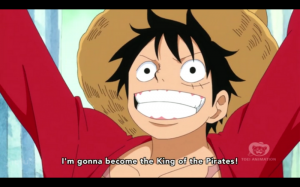


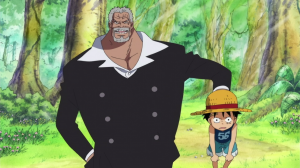
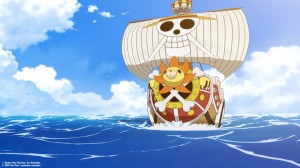

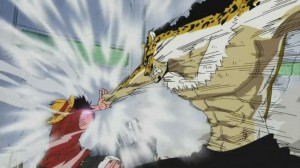

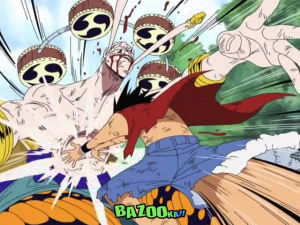
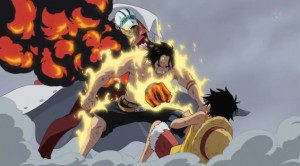

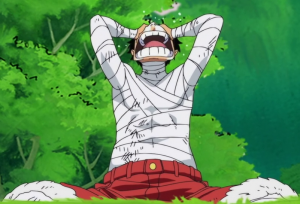
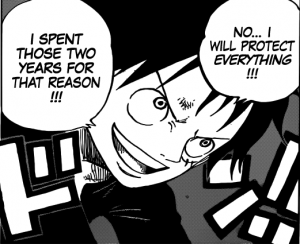
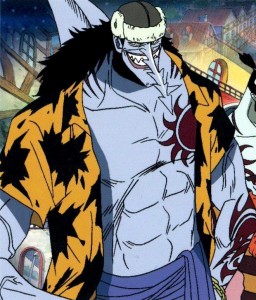
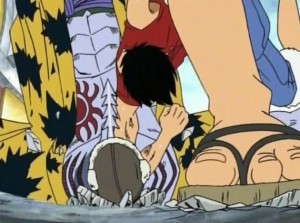
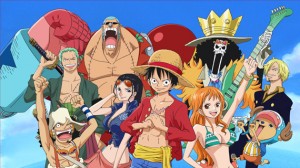
This is a fantastic post! I learned a lot, because I am one of the probably few people in the seminar who haven’t heard of this series. I blame my age, and the fact that I’m so darn busy with teaching and research that I haven’t kept up AT ALL with popular culture in the past decade or so. Which I am not happy about.
At any rate, not knowing anything about the series, I can’t comment on whether your analysis of it works in terms of the series itself, but what you’ve described does sound like the sovereign individual for Nietzsche and Owen. I wonder if Luffy could also be described in the way Gemes suggests is important for the sovereign individual, namely having a stable, ordered hierarchy of drives?
On a completely different note, officially, one shouldn’t use images in a public blog post unless they are either not copyrighted or licensed for reuse, such as with a Creative Commons license. I just need to let you know, because it’s at least conceivable that someone might complain if this isn’t the case for the images used here. Best practices are also to give attribution for the images and state where they came from!
It is interesting to note that even though we may have a hard time finding sovereign individuals as actual humans, they may be more prominent in popular culture. This not only shows that perhaps there is something to this as an ideal, but also perhaps that it’s a difficult enough idea to reach that while we can write such characters, it’s hard to be one?
This is such a great post… I totally agree that philosophy requires new mediums, new domains, or at least a new style. I bet you’d like this great article about Jacques Ranciere and his struggle against intellectuals, summarizing his confidence that people will “figure it out” on their own – http://www.critical-theory.com/who-the-fuck-is-jacques-ranciere/
In the light of the Foucault we’ve been reading, I wonder what the analysis would look like from the perspective of ‘problematization’ – from what perspective do freedom, autonomy, sovereignty, etc… become problems for us? What are the power relations at work there?
Is Luffy, (for example), the ideal of free-market capitalism (more-so than Nietzsche’s ideal)? The ability to ‘do business’ in whatever way we see fit, and to sign only those ‘contracts’ of which we are the author… the tragedy of the ‘backroom dealings’ of Arlong, and his breach of contract… I dunno. Maybe too much of a projection? I’m not familiar with the series, but it sounds pretty sweet.
On a side note, I was never really convinced that the ‘sovereign individual’ is an ideal of Nietzsche’s – that article Dr. Hendricks gave us by Christina Davis Acampora was so convincing for me – when she said something to the tune of, “perhaps respectability for Nietzsche among those with Kantian and liberal philosophical inclinations) seems to be Owen’s goal, but I do not think it would be Nietzsche’s.” it really clicked.
I came across this article today and wanted to say you are spot on, I think there’s a powerful, valuable message in OP.
“Perhaps the immense presence of the sovereign individual in popular culture means that it is an ideal that can be realized in the future or one that has already been realized.”
The sovereign individual you are describing is a pretty high bar, but I think not only is the idea alive and well in popular culture, but that One Piece is exploring this concept as well as you think it is, and that is in fact *influencing people.* I’m one of them. In the last few years I threw it all to the wind, completely disgusted with corporatism and our broken systems of authority, and went completely solo against all authority as a pro se litigant. I drop lawsuits challenging shoddy corporations and my local government any time they encroach on my time or resources without express permission. Nobody owns my time. Nobody takes advantage of me or anyone around me without their bank account suddenly catching fire. It’s been an amazing ride.
Each of the cases I choose are about corporate exploitation (It is hard to beat the government honestly, I’ve been trying). *I* personally choose, each time, what I work on, what I change, even what I get paid at the end of each case, because they always choose settlement after enough of their money catches fire. I own all my time.
Conversely, this wild decision to become a pro se litigant means I can never pass a background check for a job ever again, I won’t be getting credit or loans from any bank and probably any individual that isn’t a personal acquaintance. I have no idea what my retirement or future will look like, I’m essentially divorced from the system.
To do this was an absurd choice: I had to throw all caution to the wind, teach myself about law, case filing, how to exert external pressure on these corporations. I had no steady income for a while, was on the verge of homelessness and even lived out of my car a few times. I was so disgusted with authority after the last few years I went to the verge of permanent homelessness and death to escape it. Everybody that knew me was worried I was absolutely batsht crazy. But instead of dying, or staying homeless, I came out the other side. I own all my time. I have all the money I need now making great income every month. I *take* it, like stolen treasure, from shtty corporations that already took it from normal, working class people. I’m dodging at least one judgment from a case that blew up in my face, every day I’m flying by the seat of my pants. It’s scary, exciting, but also I feel *free* in a legendary way I never thought possible, because I put my foot down over a bunch of nonsense and decided to essentially be a corporate pirate.
One Piece heavily inspired what eventually became my “Fck It” decision, I love the show. The themes are something I think about all the time as I continue with this ridiculous plan to be free and smack some sense into the corporations we are all surrounded by. I love it. This was a great article, and helped me hone in on some ideas I’ve been tossing about. You were spot on wondering if it will encourage people to essentially ‘pirate out,’ I’m living proof it’s happening Thanks for the good article!